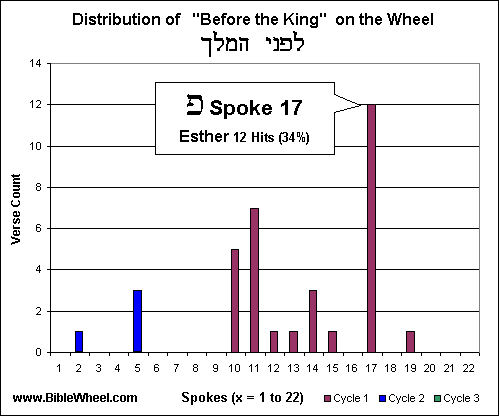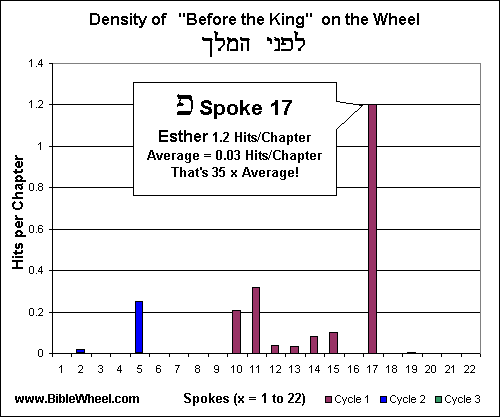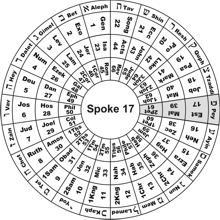Before the King
Because Haman the son of Hammedatha, the Agagite, the enemy
of all the Jews, had devised against the Jews to destroy them, and had cast
Pur, that is, the lot, to consume them, and to destroy them;
But when Esther came before the king, he commanded by letters that
his wicked device, which he devised against the Jews, should return upon
his own head, and that he and his sons should be hanged on the gallows.
Esther 9:24f (Spoke 17, Cycle 1)
| Before the King |
לפני המלך
Lipnei HaMelek |
The Book of Esther has a number of unique features that integrate
with its position on Spoke 17 of the Wheel. Its key phrase is "before the King" which is
central to the story as seen in the quote above. The Jews were set to be destroyed until
Esther went before the King. This phrase is based on the fundamental
Pey KeyWord פנים (panim, face). It
is formed by prefixing panei (the construct form of panim) with Lamed to indicate the preposition to/for.
The distribution of this phrase throughout the Bible yields
a tremendous insight into the Word of God. It is maximized in the Book of Esther, nearly twice above the
second highest peak, and more than times the average!

The first occurrence of the phrase is in 2 Samuel after David rose to the Throne. Many of the hits are then
found in the book of 1 Kings as one might expect.
The significance of these results becomes more evident when we recall that the books of the Kings have a lot
more chapters than Esther, so that the peak in Esther actually represents a much higher density than
is apparent from the graph. To see this, we simply graph the number of hits per chapter:

Now the truly astound integration of the meaning of Pey - the 17th letter with the theme of the 17th
Book is impossible to miss. The story started with his natural desire to
reveal his glory in fleshly mimicry of the Transfiguration:
In the third year of his reign, he made a feast unto all his princes and
his servants; the power of Persia and Media, the nobles and princes of the provinces, being
before him: When he shewed the riches of his glorious kingdom and the honour of his excellent
majesty many days, even an hundred and fourscore days.
Esther 1:3ff (Spoke 17, Cycle 1)
Then, after showing off his riches for 180 days he commanded his chamberlains to ...
... bring Vashti the
queen before the king with the crown royal, to shew the people and the princes her beauty:
for she was fair to look on.
Esther 1:11 (Spoke 17, Cycle 1)
This phrase can be trace through the whole story (which I intended to do in the article
Purim as soon as I get a little more time) until we reach the end,
where the Books's entire theme is explained in terms of it:
To stablish this among them, that they should keep the fourteenth day
of the month Adar, and the fifteenth day of the same, yearly, As the days wherein the Jews
rested from their enemies, and the month which was turned unto them from sorrow to joy,
and from mourning into a good day: that they should make them days of feasting and joy,
and of sending portions one to another, and gifts to the poor. And the Jews undertook to
do as they had begun, and as Mordecai had written unto them; Because Haman the son
of Hammedatha, the Agagite, the enemy of all the Jews, had devised against the
Jews to destroy them, and had cast Pur, that is, the lot, to consume them, and to destroy them;
But when Esther came before the king, he commanded by letters
that his wicked device, which he devised against the Jews, should return upon his
own head, and that he and his sons should be hanged on the gallows.
Wherefore they called these days Purim after the name of Pur.
Esther 9:21ff (Spoke 17, Cycle 1)
I have long recognized this as a manifestation of the meaning of the Pey KeyWord Panim - long before
I had the technology to measure the frequency of the phrase and graph the results. I simply
knew that this was the meaning of this book. To then discover that my "intuition" pefectly coheres with the distribution of a phrase based on a
fundamental Pey KeyWord demonstrates and confirms the objective validity of the Bible Wheel.
| 


